The AMD Ryzen 3 3300X and 3100 CPU Review: A Budget Gaming Bonanza
by Dr. Ian Cutress on May 7, 2020 9:00 AM ESTPower Consumption and Frequency Ramps
On the box, both processors are listed as having 65 W TDPs. With its Zen-based hardware, AMD has been relatively good at staying around that official on-the-box value, even during turbo. In the last generation, AMD introduced a feature called PPT, or Package Power Tracking.
- For 105 W processors, PPT is >142 W
- For 65 W processors, PPT is >88 W
- For 45 W processors, PPT is >60W
This allows the processor to raise its power limits, assuming it isn’t breaching thermal limits or current limits, and consequently raise the frequency. As a result, while we see 65 W on the box, the real world power consumption during most tasks is likely to be nearer 88 W, unless the current or thermal lines are crossed.
As a new element to our testing, we are recording power over a number of benchmarks in our suite, rather than just a simple peak power test.
AMD Ryzen 3 3300X
For the faster chip, we saw a peak power in both of our tests of around 80 W.
With yCruncher, which is somewhat of a periodic load, the power consumption dropped over time to nearer 75 W.
3DPM is more obvious with its idle steps between loads, being 10 seconds on then 10 seconds waiting. The power almost peaked at a similar amount here.
In both of these graphs, the package power when idle is around 16-17 W. I looked back through the data, and noticed that out of this power only 0.3 W was actually dedicated to cores, with the rest being towards the big IO die, the memory controllers, and the Infinity Fabric. That’s still pretty substantial for an idle load.
At low loads, the power per core was around 14 W, while at full load it was slightly less depending on the test. This is a bit away from the 20 W per core we get from the high end Zen 2 processors, but these only go to 4.3 GHz, not 4.7 GHz+. This is about in line with what we expect.
On our frequency ramp test, the Ryzen 3300X went from an idle state to peak power within 17 milliseconds, or approximately a frame at 60 Hz.
One of the new features with Ryzen 3000 is CPPC2 support, which AMD claims to reduce idle-to-turbo ramping from 30 milliseconds to 2 milliseconds. We’re seeing something in the middle of that, despite having all the updates applied. That being said, the jump up to the peak frequency (we measured 4350 MHz, +50 MHz over the turbo on the box) is effectively immediate with zero skew across a range of frequencies.
AMD Ryzen 3 3100
Given that the TDP number on the side of the box says 65 W as well, any reasonable user would assume that the power of this chip would be equal, right? Regular readers will know that this isn’t always the case.
In our yCruncher test, because the turbo frequency is lower than the 3300X, it means the voltage can be lower, and thus power is lower. Our history of testing Zen 2 has shown that these cores get very efficient at lower frequencies, to the point where our processor doesn’t even break that 65 W threshold during yCruncher.
Similarly the 3DPM peaks are also lower, barely going to 55 W during an AVX2 workload.
On the frequency ramp side, we see another instance of a 16-17 ms transition.
Summary
For the peak power out of all of our testing, we saw the Ryzen 3 3300X hit a maximum of 80 W, and the Ryzen 3 3100 go to 62 W. When we compare that to the Core i7-7700K, at 91 W TDP / 95 W peak, combined with most of the results on the next few pages, AMD by comparison is more efficient.


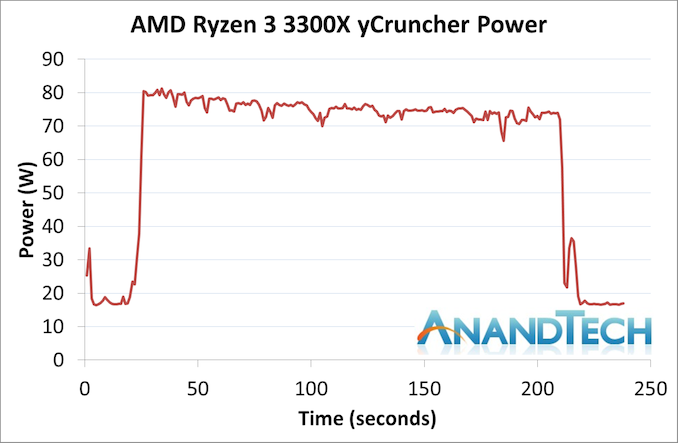
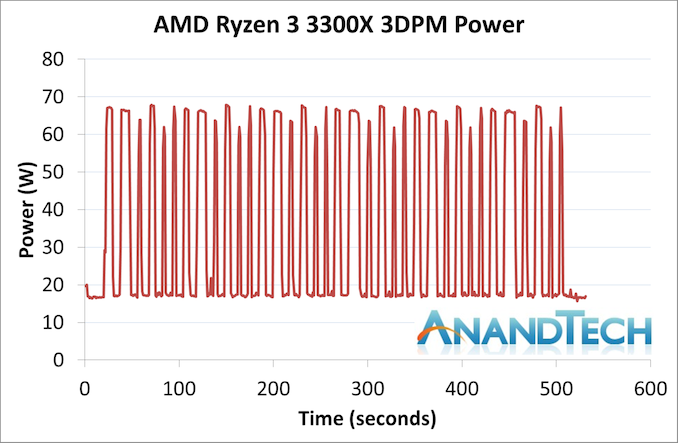
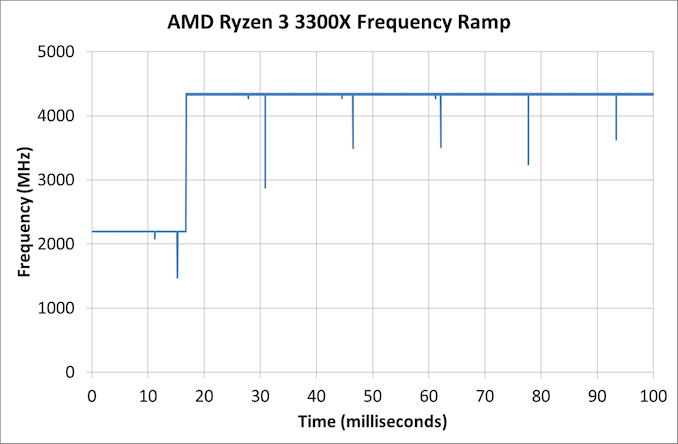
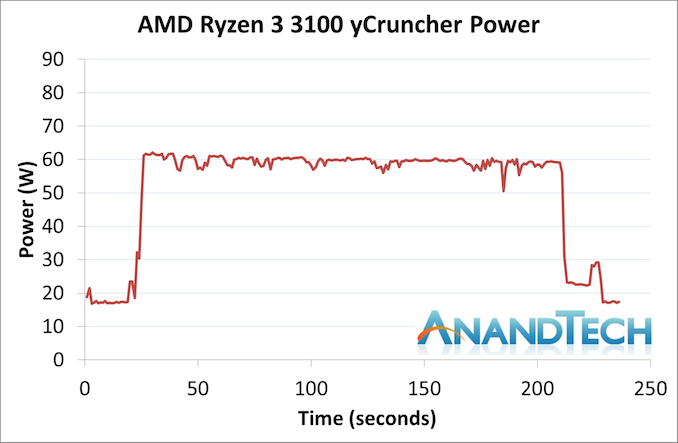
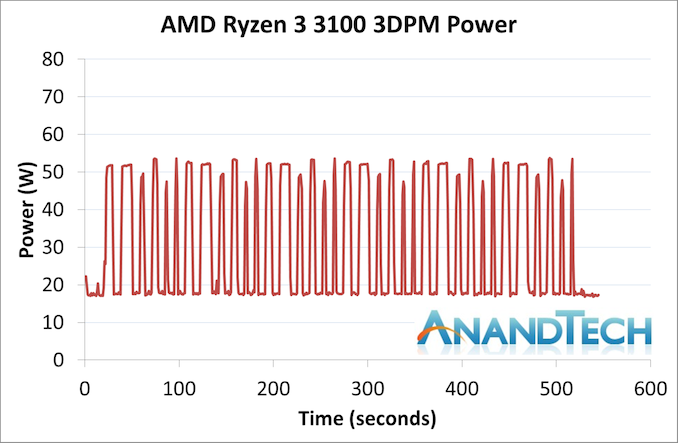
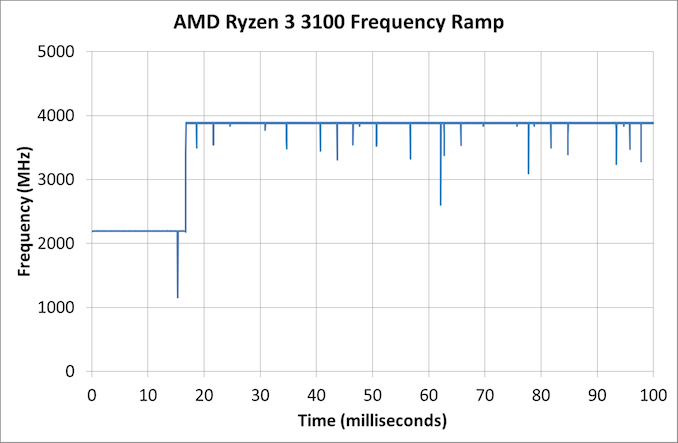








249 Comments
View All Comments
BenSkywalker - Friday, May 8, 2020 - link
You just called them AMD shills. They went into this review to prove how great AMD is, that is not journalism, that is not a review, that is a marketing campaign.Literally zero need to use the CPU bench tool they have, literally every other site I've checked has a useful, much better review, although it doesn't hit the level of marketing you are looking for.
Spunjji - Monday, May 11, 2020 - link
"Openly stating the obvious conclusion that your empirical testing led you to is a marketing caompaign" is exactly the sort of anti-intellectual, brain-dead take I have come to expect from you, Ben.He didn't call them AMD shills - you did, and all for daring to have an opinion.
BenSkywalker - Friday, May 15, 2020 - link
"They try to make a point with their review"That is to the letter the opposite of objectivity, that is precisely what shilling is, and I'm not the one that said it. Is English not your first language? You truly shouldn't being up intellect if you don't comprehend the words being used.
Deicidium369 - Friday, May 8, 2020 - link
is it any different that the AMD Fluff like "Which is the best CPU" "Which is the best Workstation CPU" etc ...Spunjji - Monday, May 11, 2020 - link
How was that article "AMD fluff"?Oh, because Intel's offerings got panned. How sad. I guess that means Anandtech has a bias that tracks roughly with which parts are the best at any given time. Its almost like... objectivity 🤔
PeterCollier - Monday, May 11, 2020 - link
I agree. Ian should take some classes from Andrei on chart creation and proper benchmarking.Fataliity - Friday, May 8, 2020 - link
The first page talks about,Which should you buy? the 3100/3300 versiohns, or a 2600, or a 1600AF?
And then the benchmarks compare them.
He's comparing what you can buy in the price range, I thought it was easy to understand.
BenSkywalker - Friday, May 8, 2020 - link
The world does not revolve around what amdownzjoo.com has as a recommended processor. Even if we were limiting ourselves to that, what about the 3200G? Every other site I found handled their reviews of this product much better.Spunjji - Wednesday, May 13, 2020 - link
What *about* the 3200G? It's an older, slower CPU. If you're going to add a dGPU, it's pointless. If you're not, you're still better off waiting for the 4000 series.The desperate scraping for even a semblance of a point in your posts is positively painful.
BenSkywalker - Friday, May 15, 2020 - link
Wanting to see how a $99 CPU compares to a $99 and a $129 CPU is pointless..... You have a special way of viewing things.